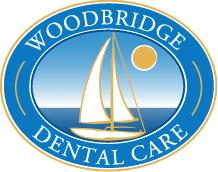Dentist Woodbridge
 Do you brush your teeth after lunch? If you’re one of the millions of people who work outside the home, chances are you don’t have the time or resources to brush during the day. However, not being able to brush doesn’t mean you can’t protect your teeth at work.
Do you brush your teeth after lunch? If you’re one of the millions of people who work outside the home, chances are you don’t have the time or resources to brush during the day. However, not being able to brush doesn’t mean you can’t protect your teeth at work.
Grab a drink of water. When you finish eating, get a drink of water. Swish the water around in your mouth, then spit or swallow it. Water helps to remove small particles of food that can remain on your teeth after your meal or snack.
Chew sugarless gum. There are certain types of sugarless gum that are approved by the American Dental Association (ADA) as good for your oral health. The reason for this is that chewing stimulates the production of saliva in your mouth. That saliva washes away food particles and helps to neutralize acids on your teeth.
Limit time drinking coffee or soda. Coffee, soda, tea, and many other beverages contain high levels of sugars and acids. The more time you spend sipping your drink, the longer your teeth are exposed to these sources of decay. Instead of spending an hour taking small swallows, drink quickly to limit exposure, then rinse your mouth or switch to water to help counteract the effects.
Brush and floss when you can. Try to keep to a regular routine of good oral hygiene practices when you are at home. Brush at least twice daily, for two full minutes each time. Floss or use an interdental cleaner of your choice once a day. Keep your recommended appointments to have your teeth cleaned and evaluated by our team.
Taking care of your teeth doesn’t have to interrupt your workday. Keeping these simple tips in mind can help protect your mouth from tooth decay, periodontal disease, and other oral health issues.
Woodbridge Dental Care
4315 Ridgewood Center Dr, Woodbridge, VA 22192
(703) 670-4994






 Cosmetic dentistry has been around for ages. We’ve noticed that now, more than ever, people are concerned with overall wellness in addition to a beautiful smile. In past years, we had many patients come to us seeking whitening and seeming unconcerned with ridding their smile of infection and decay.
Cosmetic dentistry has been around for ages. We’ve noticed that now, more than ever, people are concerned with overall wellness in addition to a beautiful smile. In past years, we had many patients come to us seeking whitening and seeming unconcerned with ridding their smile of infection and decay. We often have visitors to our office ask about solutions for fixing stained teeth or filling in gaps between teeth. We sometimes suggest veneers. Veneers are one cosmetic option available for correcting your smile. Here’s what you should know about veneers, and whether they are right for you and your smile.
We often have visitors to our office ask about solutions for fixing stained teeth or filling in gaps between teeth. We sometimes suggest veneers. Veneers are one cosmetic option available for correcting your smile. Here’s what you should know about veneers, and whether they are right for you and your smile. Your mouth is a gateway to the rest of your body. Bacteria of all kinds are present in your mouth. While some are benign, others may pose a threat to your health. Maintaining a daily oral hygiene routine and visiting our dental office for regular appointments can help keep your mouth free of harmful bacteria. Below are 3 common ailments that have been shown to be negatively impacted by poor oral health. Read the information below if you suffer from any of these conditions and are worried that your oral health might be a contributing factor.
Your mouth is a gateway to the rest of your body. Bacteria of all kinds are present in your mouth. While some are benign, others may pose a threat to your health. Maintaining a daily oral hygiene routine and visiting our dental office for regular appointments can help keep your mouth free of harmful bacteria. Below are 3 common ailments that have been shown to be negatively impacted by poor oral health. Read the information below if you suffer from any of these conditions and are worried that your oral health might be a contributing factor. Calcium is an important mineral for building strong, healthy teeth. Not everyone can tolerate the lactose found in dairy, which is often a prime source for calcium. There are a wide variety of options available to get the calcium you need. Here are six options rich in calcium:
Calcium is an important mineral for building strong, healthy teeth. Not everyone can tolerate the lactose found in dairy, which is often a prime source for calcium. There are a wide variety of options available to get the calcium you need. Here are six options rich in calcium: It is not uncommon for many of us to grab a bite to eat in a hurry. Americans have grown accustomed to bigger food portions at restaurants, but our mouths have not. Trying to fit that oversized sandwich or apple in your mouth might be worse for you than you have ever imagined. Below are some reasons why this could be detrimental for your oral health and what you can do about it.
It is not uncommon for many of us to grab a bite to eat in a hurry. Americans have grown accustomed to bigger food portions at restaurants, but our mouths have not. Trying to fit that oversized sandwich or apple in your mouth might be worse for you than you have ever imagined. Below are some reasons why this could be detrimental for your oral health and what you can do about it. It can be difficult to get your child to practice proper oral care unsupervised. However, the long-term benefits of an early start to optimal oral hygiene are worth the effort. Below are some tips to help you make oral health a fun part of your child’s daily routine.
It can be difficult to get your child to practice proper oral care unsupervised. However, the long-term benefits of an early start to optimal oral hygiene are worth the effort. Below are some tips to help you make oral health a fun part of your child’s daily routine. When you are close to someone you can often be overly comfortable in sharing. This is especially true with kissing. In one kiss, more than 500 germs can be shared between two people. Sharing a kiss can have an impact on your oral health. Here are some of the dangers of kissing.
When you are close to someone you can often be overly comfortable in sharing. This is especially true with kissing. In one kiss, more than 500 germs can be shared between two people. Sharing a kiss can have an impact on your oral health. Here are some of the dangers of kissing. While brushing or flossing your teeth, do you notice blood on your toothbrush or in the sink? Swollen, red, or tender gums can bleed when brushing or flossing, even if you are brushing gently. While it may seem harmless, it is important that you do not ignore these symptoms as they may be signs of a more serious issue. Here are four reasons why your gums may be bleeding, and what you can do for prevention.
While brushing or flossing your teeth, do you notice blood on your toothbrush or in the sink? Swollen, red, or tender gums can bleed when brushing or flossing, even if you are brushing gently. While it may seem harmless, it is important that you do not ignore these symptoms as they may be signs of a more serious issue. Here are four reasons why your gums may be bleeding, and what you can do for prevention. Don’t be fooled by the label “100 percent fruit juice.” Drinks advertised in this way might seem like a healthy choice, but these drinks may be doing more harm than good. In fact, fruit juices contain sugar that can lead to tooth decay. The American Academy of Pediatrics (AAP) recently reevaluated their recommendations for allowing small children to consume fruit juice. Here’s what you need to know about the new guidelines.
Don’t be fooled by the label “100 percent fruit juice.” Drinks advertised in this way might seem like a healthy choice, but these drinks may be doing more harm than good. In fact, fruit juices contain sugar that can lead to tooth decay. The American Academy of Pediatrics (AAP) recently reevaluated their recommendations for allowing small children to consume fruit juice. Here’s what you need to know about the new guidelines.